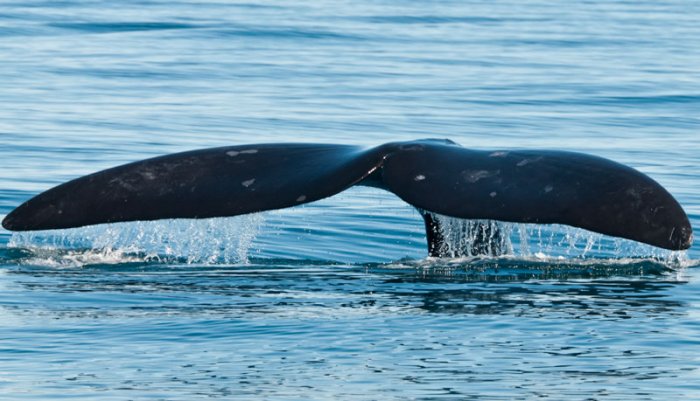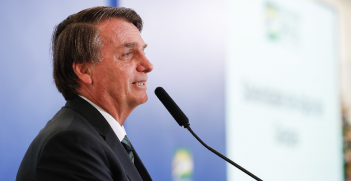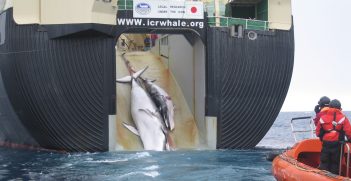Japan at the International Whaling Commission

Top of the agenda at this week’s International Whaling Commission meeting will be Japan’s proposal to resume commercial whaling. Will Japan achieve its Way Forward or is it on the way out?
At this week’s meeting of the International Whaling Commission in Florianopolis in Brazil, Japan is proposing significant changes to the Commission and the International Convention for the Regulation of Whaling. These changes are intended to support a carefully regulated resumption of commercial whaling.
Japan’s Way Forward
Japan’s ‘Way Forward’ proposal contains two reform measures: first, a resolution for the establishment of a Sustainable Whaling Committee to recommend sustainable commercial catch limits for abundant populations; second, an amendment to the Convention to change the voting mechanism from a three-fourths majority to a simple majority for amendments to the Convention Schedule. This is significant because the Schedule contains the current zero commercial catch limit, commonly referred to as ‘the whaling moratorium’, which is held in place by the three-fourths majority rule.
Establishing a new committee by resolution requires a simple majority but amending the Convention requires the Commission to reach consensus. These are complex political issues involving the fundamental opposition of the pro and anti-whaling environmental policies of Commission members.
There are two issues of interest: whether Japan has the numbers to pass the resolution to establish the Committee; and whether there is sufficient political recognition of the consequences of a Japanese withdrawal from the Convention if its proposal fails.
Prospects for success
The Chair of the 67th International Whaling Commission meeting is Joji Morishita, the previous Commissioner for Japan from 2013 to 2016, who has attended Commission meetings since 1999 as a delegate. Although it may seem fortuitous timing to have a Japanese Chair, there is little advantage. The Chair can display no political bias as an impartial guide of the Commission’s deliberations, managing the agenda according to the rules of debate.
It is uncertain whether Japan has the numbers to reach a simple majority to pass the resolution establishing the Sustainable Whaling Commission. The voting record indicates that it is likely to be blocked by the European Union and Buenos Aires Group votes. If it were to pass, the Committee would join the Finance and Administration Committee, the Whale Killing Methods Committee and the Aboriginal Subsistence Whaling Committee as a significant decision-making organ of the Commission. Committees convene for the week preceding the full Commission meeting to resolve matters to be put before the Commission for final approval. The Way Forward proposal envisions that the Scientific Committee would advise the Sustainable Whaling Committee on which stocks are considered abundant, and the Committee would then recommend catch allocation in accordance with Scientific Committee advice on harvest of abundant stocks.
The proposal to change the voting mechanism is unlikely to reach consensus. It would require an ideological shift from Australia, New Zealand, the US, the EU, and the Buenos Aires Group. Intersessional informal discussions of members reveal the usual polarisation of views: The Russian pro-whaling response is that “political motives on whale conservation block scientific basis for sustainable use of whales”, while Australia views the proposal as unnecessary as “the [current] governance reform agenda provides an opportunity for all parties to work together irrespective of their views on whales and whaling”.
To allow a simple majority Commission vote to approve Schedule amendments in accordance with decisions made by a Committee established by a simple majority would circumvent the three-fourths majority otherwise required to amend the Schedule, which holds the moratorium in place. But it may also simply shift the battleground to a Committee rather than the Commission floor, as the Committee will also need a simple majority if consensus is not reached.
Results of failure
Will the failure of the Way Forward proposal trigger a Japanese withdrawal from the Commission, as occurred with Norway? The proposal states:
Taking into account the history of past compromise efforts where indefinitely prolonged negotiation all resulted in failure, Japan does not intend to prolong discussions on its reform proposal as were the cases such as the RMS package and “Future of the IWC” negotiations.
Some might see this as signaling an intention to withdraw from membership should the whole package fail. However, it may simply indicate Japan’s intention not to delay the course of the meeting if consensus cannot be reached on the amendment or the Committee.
There are risks to both Japan and the Commission if no common ground can be found. For the Commission, if Japan were to withdraw from the Convention, it would lose credibility as an international regulatory body. For Japan, if it were to withdraw and begin commercial whaling, there is every likelihood of an intensification of international campaigns against Japanese whaling and the possibility of court action in the International Tribunal for the Law of the Sea. Key to the loss of Commission credibility is that Japan would not be restricted to whaling under the scientific whaling exemption. Outside of the constraints of the Commission, Japan would be able to resume commercial whaling in a similar way to Norway in the early 1990s.
The best hope for a way forward is to establish the Sustainable Whaling Committee as a first step toward the normalisation of commercial whaling regulation by the Commission. This will be seen by pro-whaling states as an achievement and a step in the right direction. It will also allow anti-whaling states time to consider their political position before the next meeting in 2020, before more whaling moves outside Commission regulation and control.
Dr Julia Jabour is a Senior Lecturer in Law and Policy at the University of Tasmania and Leader of the Ocean & Antarctic Governance Research Program at the Institute for Marine and Antarctic Studies.
Lucy Smejkal is a postgraduate student in the Faculty of Law at the University of Tasmania.
International Whaling Commission material referred to in this article can be accessed on the IWC site through portal registration and application for access.
This article is published under a Creative Commons Licence and may be republished with attribution.





